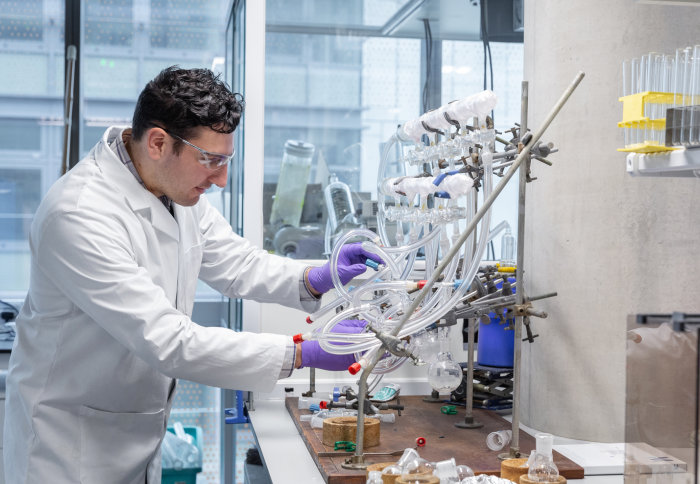“Climate change will affect us all within our lifetime” – new Grantham Lecturer

Dr Andreas Kafizas at work in the Chemistry labs at White City
Imperial College Research Fellow Dr Andreas Kafizas joins the Grantham Institute as proleptic lecturer in Low-cost Solar Fuel Technologies.
Dr Kafizas, formerly a Junior Research Fellow in the Department of Chemistry, dedicates his research to what he describes as “useful chemistry”. In particular, he focuses on developing light-activated materials that use sunlight for a range of applications, such as producing renewable fuel, or purifying polluted air.
We caught up with him to find out more:
Did you always want to pursue an academic career?
When I was younger, I wasn’t really focused on anything other than sport. I enjoyed most subjects, but chemistry really fascinated me. It wasn’t my strongest subject but I stuck with it as I really enjoyed it. Later on, I realised that the skills I learnt during my degree could be applied to solve today’s problems, in particular, developing technologies for a carbon-neutral future, and technologies that can remediate air and water pollution.
Can you briefly describe the focus of your research?
I should start by saying that sunlight is our most abundant renewable energy source, so developing technologies that utilise sunlight will be key to a carbon neutral future. My work is focused on developing light-activated technologies that can drive a range of useful processes. For instance, I’m developing materials that can use sunlight to convert water into hydrogen fuel, a fuel that burns cleanly back to water with no carbon dioxide released. I’m also developing coatings that can go on to the facade of buildings that can purify polluted city air.

Aside from your research, what other aspects of your work do you enjoy?
In my time at Imperial, I’ve taken part in the Imperial Festival, Pint of Science, and talks at schools. I love outreach activities like these because I enjoy sharing chemistry with others, particularly children. Their enthusiasm is infectious, and they can surprise you with the insight of their questions. Children need to know about the biggest problems the world is facing today, and they need inspiration to be creative in how to tackle these problems.
What do you think is the most effective way to communicate climate science and engage people with climate change?
We are already seeing some of the global impacts of climate change. Dr Andreas Kafizas
For us to generate more support for climate change action, we need to take it away from being an abstract global phenomenon and make people realise it will affect us all locally in some way within our lifetime.
We are already seeing some of the global impacts of climate change – such as the increase in hurricanes in the Caribbean, the bleaching of coral reef, the expansion of desert space in the sub tropics, the melting of polar ice. And these impacts are starting to be felt on a local level - various places in the UK are suffering from flooding and droughts. In the future, if we don’t tackle climate change, these local problems will become worse.
In terms of climate change and environment, what would you like to see happen in the next few years?
I’m very proud to be working in a UK-based institution where we take climate change very seriously. Dr Andreas Kafizas
I would like to see more investment in the research and development needed for the UK to move towards a carbon-neutral economy. The UK have been world leaders in many policy changes related to climate change and the environment. We now need to pledge more investment to ensure we meet the targets that we have promised.
Are you optimistic the world will meet the challenge of climate change?
Frankly, I don’t know. There’s a lot of uncertainty today, especially with the President of the United States trying to back out of the Paris Accord. I’m very proud of the UK stance, and proud to be working in a UK-based institution where we take climate change very seriously.
Do you have any eco-friendly habits you'd like to share?
I’m a scrooge with the heating and I don’t have a car in favour of public transport, but these habits are just common sense – they’re not just good for the environment, they help save money too!
Article supporters
Article text (excluding photos or graphics) © Imperial College London.
Photos and graphics subject to third party copyright used with permission or © Imperial College London.
Reporter
Lottie Butler
The Grantham Institute for Climate Change